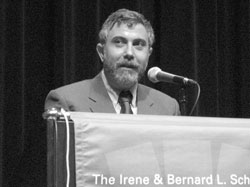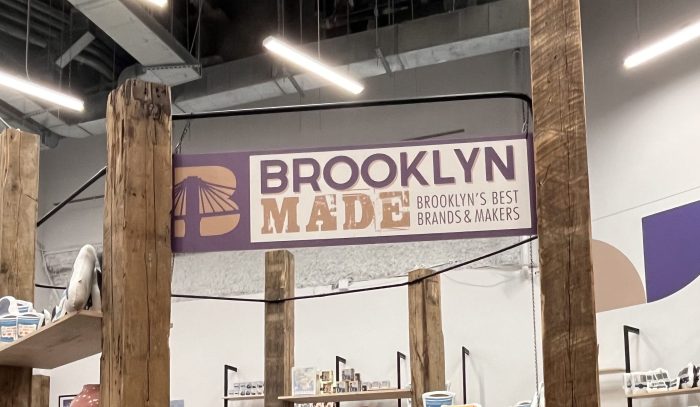By JOHN W. SUTTER
Paul Krugman, one of the Bush administration’s most tenacious and effective critics arguing from no better perch than a biweekly column in the New York Times, addressed a New School University audience last week on the subject, “What Went Wrong?”
Introduced by New School University President and former Nebraska Senator Bob Kerrey as part of the Irene and Bernard Schwartz lecture series, Krugman launched into an analysis of the problems affecting the American economy as going beyond the present recession, the stock market bubble, Sept. 11 and the Bush administration.
“The fix we’re in and the economic problems we’re having have much longer roots. If it hadn’t happened this administration, it would have happened one of these years,” Krugman said.
But Krugman confessed that he was only going to tell the packed auditorim part of the story of what went wrong because the publisher of his upcoming book, due out in September, warned him not to spill the beans.
Along the way to his (partial) deep analysis, Krugman spent some time analyzing the present economic predicament, “where we clearly have an economy that is off the rails.” This is partly due to the stock market bubble, a “natural ponzi scheme that sucked people in.” While the dot-coms were entertaining while they lasted, he said, “they were less important than the telecoms.” Bad investment decisions (“a lot of unused fiber optic cable in the ground”), debt run up and an “explosion of bad practice in corporate governance” continue to haunt us.
But to Krugman, our short-term economic pre-dicament is basically an easy problem to solve: first rule: no long-term tax cuts “as the surplus we had was an illusion — a bubble surplus, which only lasted one year, which was FY 2000.” Other policies “that are sensible, not difficult, not hard to figure and that shouldn’t even be controversial” are: lower interest rates (“we’ve already done that”), maintain government spending, launch small public-works projects, increase aid to state governments and target tax cuts to people most likely to spend the money to stimulate the economy.
What has the Bush administration done or proposed?
“It’s amazing, a pretty near inversion of what you would do sensibly,” Krugman noted: Long-run tax cuts, “paying no attention to the original rationale that the government was running excessive surpluses that have now disappeared with a vengeance;” tax cuts for the wealthy that conceal their true budgetary cost and deliver little or no present stimulus; small hacks at federal spending programs that reach a broad number of people; and an attempt to protect and perpetuate the redistribution of wealth upwards through elimination of the inheritance tax.
“Why this kind of policy? Why are the policies so tilted towards benefiting a very small number of people? Why are they sold so misleadingly? And why do they get away with it?” Krugman asked. That the administration attempts to sell its policies and inclinations as a populist program that will create jobs and “cut taxes for regular people” is what particularly galls him.
“The dishonesty is not an accident,” he pointed out. “You must try to convince a large number of voters who are not wealthy that policies geared towards the rich work.”
This is where Krugman hit his stride and launched into the “What Went Wrong” title of the speech. At the core of the current economic polarization is “an extraordinary pulling apart of the American income distribution…Action now isn’t in the top quintile, it’s an explosion at the top of the scale, not even in the top 10 percent or even in the top five percent. You need to look at the top one percent, tenth of one percent and hundredth of one percent.”
He cited data to support his case “that the economic elite have pulled away from the rest of the country.” In 1970, the top 1 percent of the American income distribution earned nine percent of total income, the top 0.1 percent earned 2.8 percent and the top 0.01 percent (one hundredth of 1 percent) earned 1 percent. In the year 2000, these numbers had shifted to 22 percent of all income for the top 1 percent, 11 percent for the top 0.01 percent and 5 percent of all income for the top 0.01 percent.
“The people at the very top used to be a minor factor; that is now completely transformed,” he noted. “We are now fully back to, or above, the level of concentration of income that we had in the 1920s and all indications are the trends are continuing…We’re going back to a ‘Great Gatsby’ society.” According to Krugman, the United States is now completely off the scale in terms of income inequality compared to other developed capitalist countries, “unique in its private-sector inequality and in the harshness of its public policy.
“Major corporations in the 1960s, by modern standards, looked like small socialist republics,” he continued. “There was a general notion that you shouldn’t be too greedy, and self-dealing was regarded as a bad thing…What’s happened since is that ‘greed is good’ has triumphed as a principal of American business and more generally through American society.”
This growing inequality in distribution of income plays back into politics.
“It’s not surprising that in a society with hugely increased different income differentials, political class warfare begins to play a much larger role,” Krugman said. Because the upper 1 percent now has such wealth to protect, a whole political class is funded by the economic elite to protect that huge stockpile of wealth. “It’s a lot easier to get a cushy think-tank job if you say things that are friendly to people with very high incomes.” Think tanks, new and old media, PACS and a whole slew of supporting actors are paid well to generate and reinforce the illusion that policies tailored to benefit the economic elite are really good for everyone.
One of the ramifications of this 30-year process of worsening income inequality, according to Krugman, is that “the center has fallen out of the American political system. Votes in Congress have just pulled apart.” Krugman says that the intense polarization is happening at the legislative level, not in the public. “I think that most Americans are actually very moderate,” he noted. But he says the data on political polarization is quite clear: Democrats are voting mostly like they have been voting, on a left/right basis, for the past 30 years, but Republicans have shifted radically to the right. Where there used to be a large area of overlap between the parties there is now very little. “Instead of a populist backlash demanding that we soak the rich, what we’re having is an elite backlash demanding that we stop taxing the rich and soak someone else,” he pointed out.
The present policies go way beyond Reaganism. At least with Reagan, “there was an economic theory [supply-side economics] under which you could justify what they were doing…. The policies today are not being sold under an alternative economic theory. The current ‘economic stimulus package’ bears no resemblance to any economic stimulus package under any theory.”
To his own question on how we get out of this downward spiral of bad and dishonest policies, Krugman confessed, “Basically I don’t know,” but quickly came back with the need to face up to what’s happening. “We must realize we’re in a brave new world where policies are sold on an entirely fictitious basis…. We need to face up to how far right the Republican Party has moved, and at the very least, to try to enforce higher codes of honesty in public discussion.”
Most in the New School University audience seemed to share Krugman’s perspective and outrage. Alice Rivlin, former director of the federal Office of Management and Budget and now a professor at the Milano Graduate School of the New School, who spoke briefly on the panel after Krugman, said, “Why are they getting away with the lies and the scams? Where is the press? Where are the other Paul Krugmans?” Her words were met with applause. But for those looking for a recipe for action, the best they got from Professor Rivlin was, “I don’t understand why we are letting our democracy do this to us.”
After the event, Michael Randazzo, an administrator at the New School, said he wholeheartedly agreed with Krugman, but was disappointed.
“Why didn’t he seize the opportunity to make a grand statement? I thought, he would talk about ‘what went wrong’ and really drive a point home,” Randazzo said. “He was at one of the most liberal institutions in the country and could have said anything he wanted. We know about the disparity of income. Yes, we know about the current administration’s devious ways. Yes, we know about the political divide. What should we do about it? This is arguably the most momentous political, social and economic moment America has felt in the last 40 years, so what is wrong and how can we address it?”


















